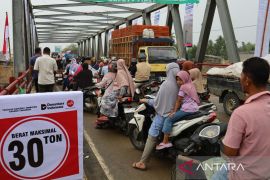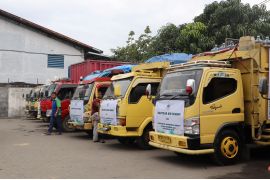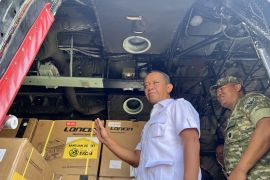Till last March, the physical construction of the 112,992 houses being built by the public housing ministry had been completed only to 0.4 percent extent.
The government is to build 112,992 units this year out of these one million houses while others are to be built by other agencies or by the private sector.
The Ministry of Public Works and Public Housing (PURR) openly admitted that million houses program for the lower-income people (MBR) has not gone on track smoothly this year.
"This year, the program is on, and while it is the beginning of the year, not much has been achieved so far. Even, the governments part in the program is lacking, and is still in the physical construction stage," Deddy Permadi, the director for house development planning of the PURR, said on March 28.
Last year, the government launched its one million houses program to provide 603,516 shelters to the countrys low-income people (MBR), and 396,464 others to non-MBR families.
This year, the government is determined to continue the program and make the procedures more easy to overcome constraints.
"We need to simplify regulations," Chief Economic Minister Darmin Nasution remarked in Jakarta on Tuesday while chairing a coordination meeting on simplifying regulations for constructing one million houses for the people of the low-income group.
According to Deddy Permadi, of the one million houses to be built this year, the government has the responsibility to build 112,992 units. But up to now, the physical construction has been realized only to an extent of 0.4 percent.
He said even the budget absorption is not significant as yet. Of the Rp7.69 trillion budget earmarked for the directorate general of housing development to build the houses, only 7.6 percent has been used.
"The 7.6 percent of funds were used only as a down payment for the construction of an athlete house in Kemayoran, Central Jakarta," he noted.
Deddy added that one of the constraints why the program had progressed slowly was the difference in perception between the government and the developers.
"They (developers) want to build roads and infrastructure first before building houses but we want them to build houses first before roads and other infrastructure facilities are built. This is because roads, if developed in advance, will be damaged as trucks and other heavy equipment will pass along these," he said.
Deddy said while developing houses for the people of the MBR class, the PURR Ministry is applying certain strategies. "In order to reduce the housing backlog and ensuring decent houses for living, we are preparing certain kinds of assistance for the people of the MBR class," Deddy stated.
The assistance, he added, will be in the form of rusunawa (low-cost rented flats), special houses, housing stimulant assistance such as assistance for new houses and house upgrading as well as public housing facilities and utilities.
He said the rusunawa is designed for residents of the MBR group who could not afford decent houses.
Deddy disclosed that based on data of the Central Bureau of Statistics (BPS) and the National Development Planning Board (Bappenas), there were 13.5 million families in 2014 that did not have houses. The housing backlog has reached 7.6 million units.
"This means that there are 5.9 million families who stay in houses that do not belong to them (rented houses). In the meantime, among the already existing houses, some 3.4 million houses are still unsuitable for living," he said.
In order to help people own houses, the government has also recently issued a law on public housing savings (UU Tepera) scheme. The UU Tapera is expected to help the government tackle the housing backlog in the country and facilitate small employees and other low-paid workers to own houses.
Chairman of the Regional Representative Council (DPD) Irman Gusman hoped that the enactment of the draft law on Tapera would help overcome the problems being faced by people from the low-income group who are keen on owning houses.
"With the law on public housing, all stakeholders are expected to find a solution to the housing problem being faced by the people," Irman stated while opening a group discussion at the Parliament building on Wednesday.
He emphasized that it was mandatory to make efforts to meet this basic necessity of the public, and it can be done by issuing a law on public housing to facilitate people to own houses.
"Efforts should not only be focused on just one sector, say financial management," he emphasized.
The government should narrow the gap in house ownership in society. Through regulations, the government is obligated to provide houses for all sections of the society, noted Irman.
The House of Representatives (DPR) enacted into law the Bill on Tapera scheme on February 23. (*)
Reporter: Andi Abdussalam
Editor: Heru Purwanto
Copyright © ANTARA 2016











